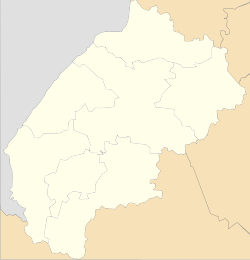Dobromyl
Dobromyl
Добромиль Dobromil | |
|---|---|
 Herburt castle ruins near Dobromyl | |
| Coordinates: 49°34′N 22°47′E / 49.567°N 22.783°E | |
| Country | |
| Oblast | Lviv Oblast |
| Raion | Sambir Raion |
| Hromada | Dobromyl urban hromada |
| Area | |
| • Total | 4.97 km2 (1.92 sq mi) |
| Population (2022) | |
| • Total | 4,111 |
| • Density | 830/km2 (2,100/sq mi) |
| Time zone | UTC+2 (EET) |
| • Summer (DST) | UTC+3 (EEST) |
| Website | dobromyl |
 | |
Dobromyl (Ukrainian: Добромиль, IPA: [doˈbrɔmɪlʲ]; Polish: Dobromil) is a city in Sambir Raion, Lviv Oblast, in western Ukraine. It is located some 5 kilometers from the border with Poland. It hosts the administration of Dobromyl urban hromada, one of the hromadas of Ukraine.[1] Population: 4,111 (2022 estimate).[2]
History
[edit]
Kingdom of Poland 1374–1772
Habsburg monarchy 1772–1918
Second Polish Republic 1918–1939
Soviet Union 1939–1941 (occupation)
Nazi Germany 1941–1944 (occupation)
Soviet Union 1944–1991
Ukraine 1991–present
Dobromyl was first mentioned in 1374, as a settlement founded by the Herburt family, upon request of Polish prince Władysław Opolczyk. In 1566 King Sigismund I the Old granted Magdeburg town rights and established two annual fairs and a weekly market.[3] Eighteen years later, Stanislaw Herburt built a castle here, the town also had a printing shop, where in 1612 the Annales seu cronici incliti regni Poloniae (The Annals of Jan Długosz) were published. In 1647, a storehouse for imported Hungarian wine was established.[3] Until the First Partition of Poland (1772), Dobromil was part of Przemyśl Land, Ruthenian Voivodeship, Lesser Poland Province. In the course of time, the branch of the Herburt family which resided in the town changed its name into Dobromilski.[3]
In 1772, Dobromil was annexed by the Habsburg Empire, and until 1918 belonged to Austrian Galicia. It was located on the main road connecting Przemyśl with Turka and Hungary.[3] After World War I, the town returned to Poland, and in the Second Polish Republic, was the seat of a county in Lwów Voivodeship. According to the 1921 Polish census, it had a population of 3,431, 50.1% Polish, 37.9% Jewish and 11.1% Ukrainian.[4]

Following the Nazi and Soviet invasion of Poland, which started World War II in September 1939, Dobromil was transferred to the Soviet Union. In June 1941, Soviet NKVD murdered here hundreds of prisoners (see NKVD prisoner massacres). Under German occupation, Dobromil was transferred to Przemyśl County, Kraków District, General Government.[5] On 30 June 1941, the German Einsatzkommando 6 committed a massacre of 50–132 Jews.[5] In October 1941, the German occupiers established a Jewish open ghetto.[5] On 29 June 1942, the ghetto was liquidated and most Jews were deported to the Bełżec extermination camp, whereas some 500 stayed in the town, including Judenrat members and Jewish policemen, who bribed the Germans, and were eventually murdered by the occupiers in November 1942.[5] On August 8, 1944 the town was seized by the Red Army.
Currently, Dobromil belongs to Ukraine. The town has a local office of the Association of Polish Culture of the Lviv Land.
In 2016, a Wall of Remembrance was unveiled on the site of the Jewish cemetery[6] (the memorial was built from more than 150 Jewish tombstones that had been lining the courtyard of a house on Mickiewicza Street since World War II).
Until 18 July 2020, Dobromyl belonged to Staryi Sambir Raion. The raion was abolished in July 2020, as part of the administrative reform of Ukraine, which reduced the number of raions of Lviv Oblast to seven. The area of Staryi Sambir Raion was merged into Sambir Raion.[7][8]
Notable people
[edit]- Physician and major of the Polish Army, Stanislaw van der Coghen, murdered in the Katyn massacre,
- Piotr Geisler, doctor and general of the Polish Army,
- Tadeusz Stanislaw Grabowski, Polish historian and professor of the Jagiellonian University,
- Kazimierz Wisniowski, brigade general of the Polish Army.
References
[edit]- ^ "Добромильская городская громада" (in Russian). Портал об'єднаних громад України.
- ^ Чисельність наявного населення України на 1 січня 2022 [Number of Present Population of Ukraine, as of January 1, 2022] (PDF) (in Ukrainian and English). Kyiv: State Statistics Service of Ukraine. Archived (PDF) from the original on 4 July 2022.
- ^ a b c d Słownik geograficzny Królestwa Polskiego i innych krajów słowiańskich, Tom II (in Polish). Warszawa. 1881. pp. 72–73.
{{cite book}}: CS1 maint: location missing publisher (link) - ^ Skorowidz miejscowości Rzeczypospolitej Polskiej. Tom XIII (in Polish). Warszawa: Główny Urząd Statystyczny. 1924. p. 8.
- ^ a b c d Megargee, Geoffrey P.; Dean, Martin (2012). The United States Holocaust Memorial Museum Encyclopedia of Camps and Ghettos 1933–1945. Volume II. Indiana University Press, United States Holocaust Memorial Museum. pp. 500–501. ISBN 978-0-253-35599-7.
- ^ "Відкриття Стіни Пам'яті на єврейському цвинтарі у Добромилі (фото) - Добромильський край". Добромильський край (in Ukrainian). 2021-01-25. Archived from the original on 2021-01-25. Retrieved 2023-11-14.
- ^ "Про утворення та ліквідацію районів. Постанова Верховної Ради України № 807-ІХ". Голос України (in Ukrainian). 2020-07-18. Retrieved 2020-10-03.
- ^ "Нові райони: карти + склад" (in Ukrainian). Міністерство розвитку громад та територій України.
External links
[edit]- (in Ukrainian) Офіційний портал міста добромиль
- (in Ukrainian) Official website dobromyl.org




